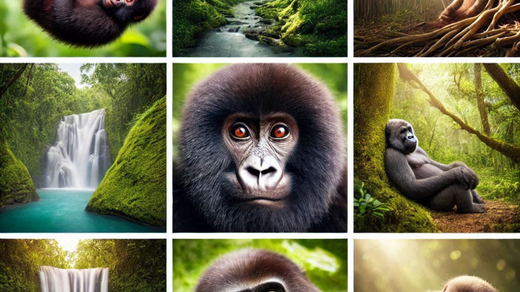Illegal Wildlife Trafficking: The Threat to Baby Gorillas Like Hafez

The Impact of Wildlife Trafficking on Gorilla Populations
Hafez, a rescued baby gorilla, embodies the dire consequences of wildlife trafficking on gorilla populations. His traumatic experience at Istanbul Airport sheds light on the ruthless exploitation that these majestic creatures endure for profit. As a victim of illegal wildlife trade, Hafez’s plight serves as a stark reminder of the urgent need to combat such illicit activities to safeguard gorillas and their habitats.
The rescue of Hafez showcases the interconnectedness between wildlife trafficking and the endangerment of gorilla species. Each gorilla taken from the wild perpetuates the decline of already vulnerable populations, jeopardizing the delicate balance of ecosystems they inhabit. By addressing the root causes of illegal wildlife trade and enhancing conservation efforts, we can strive to mitigate the devastating impact on gorilla populations and work towards a sustainable future for these magnificent creatures.
The Vulnerability of Baby Gorillas to Trafficking
Hafez, a rescued baby gorilla, serves as a poignant reminder of the vulnerabilities faced by young primates in the clutches of wildlife traffickers. Upon his rescue from Istanbul Airport, Hafez’s ordeal shed light on the heart-wrenching reality of illegal trade and exploitation that threatens the very existence of gorilla populations. His journey also underscores the critical need for stringent laws and vigilant enforcement to curb such heinous activities that jeopardize the future of these magnificent creatures.
The plight of baby gorillas like Hafez reveals the ruthless manner in which traffickers exploit these innocent animals for profit. Helpless and defenseless, these young primates fall prey to a lucrative industry driven by greed and disregard for the welfare of wildlife. As such, it is imperative for stakeholders and conservationists to ramp up efforts in raising awareness, advocating for stronger protection measures, and supporting initiatives aimed at safeguarding the vulnerable members of gorilla communities.
The Role of Illegal Wildlife Trade in Endangering Gorilla Species
Illegal wildlife trade poses a significant threat to the survival of gorilla species worldwide. The demand for gorilla body parts, such as skulls, hands, and even infant gorillas, drives poachers to target these vulnerable animals for profit. The exploitation of gorillas not only harms individual animals but also destabilizes entire populations, pushing them closer to the brink of extinction. The illicit trade in gorillas contributes to the decline of already endangered species, disrupting ecosystems and endangering the delicate balance of nature.
Case Study: Hafez the Baby Gorilla and His Ordeal
Hafez, a rescued baby gorilla, serves as a poignant reminder of the harsh realities of illegal wildlife trafficking. His journey began at Istanbul Airport, where he was saved from a fate of exploitation and suffering. Hafez’s story sheds light on the dark world of smuggling and the urgent need to combat such criminal activities to safeguard precious species like gorillas.
Resilient and courageous, Hafez’s recovery signifies the collective efforts of enforcement teams, conservation organizations, and global communities in standing against wildlife crime. Through rehabilitation and care, Hafez exemplifies the potential for positive change and the hope for a future where baby gorillas are protected from the clutches of traffickers.
How Traffickers Exploit Gorillas for Profit
Hafez, a tragic example of the exploitation of vulnerable wildlife for profit, was rescued from a fate of suffering at Istanbul Airport. His story sheds light on the grim reality of how traffickers prioritize financial gain over the well-being and conservation of precious gorilla populations. The ordeal that Hafez endured serves as a stark reminder of the relentless exploitation and cruelty that baby gorillas face in the illegal wildlife trade.
Traffickers ruthlessly capitalize on the demand for exotic animals, such as gorillas, by exploiting them for profit through smuggling and trafficking networks. These criminals prioritize monetary gain over the ethical treatment and conservation of endangered species, perpetuating a cycle of harm and endangerment for gorilla populations.
The Connection Between Wildlife Trafficking and Organized Crime
Wildlife trafficking is not just a crime against nature; it is often intertwined with organized crime networks seeking to profit from the illegal trade of endangered species. The high demand for exotic animals and their parts fuels a lucrative black market that is fueled by greed and exploitation. Gorillas, with their rarity and symbolic value, are prime targets for these criminal enterprises due to their attractiveness to wealthy buyers.
Traffickers exploit the vulnerability of gorillas by capturing them from the wild or breeding them in captivity under deplorable conditions. These animals are subjected to immense suffering as they are smuggled across borders, often enduring harsh treatment and the risk of death in transit. The link between wildlife trafficking and organized crime is a complex web that thrives on secrecy and corruption, making it challenging for authorities to dismantle these illegal networks and protect endangered species like gorillas.
Efforts to Combat Illegal Wildlife Trade and Protect Gorillas
Efforts to combat illegal wildlife trade and protect gorillas have gained momentum in recent years as organizations and governments collaborate to address this pressing issue on a global scale. By implementing measures such as increased surveillance, undercover investigations, and partnerships with local communities, authorities aim to disrupt the networks of traffickers profiting from the illegal wildlife trade. Through targeted operations and intelligence gathering, law enforcement agencies work to dismantle smuggling rings and rescue gorillas from the clutches of traffickers.
Furthermore, international initiatives focused on raising awareness about the detrimental impacts of wildlife trafficking play a vital role in combating the illicit trade and safeguarding gorilla populations. Educational campaigns, advocacy efforts, and outreach programs aim to inform the public about the consequences of purchasing illegal wildlife products and the urgent need to protect endangered species such as gorillas. By fostering a sense of responsibility and promoting ethical consumer choices, these initiatives seek to reduce the demand for trafficked animals and their parts, thereby contributing to the preservation of gorilla habitats and ecosystems.
The Importance of Education and Awareness in Preventing Wildlife Trafficking
Hafez, a young gorilla rescued from the clutches of wildlife traffickers, serves as a poignant reminder of the dire consequences of illegal animal trade. His survival is a testament to the dedicated efforts of enforcement agencies and conservation advocates worldwide. Through Hafez’s story, we witness the significance of raising awareness about wildlife trafficking and its devastating impact on endangered species like gorillas. By educating the public about the realities of this illicit trade, we can inspire action to protect these magnificent creatures and their habitats for future generations.
In order to combat wildlife trafficking effectively, it is imperative to prioritize education and awareness-raising initiatives. By enlightening communities about the consequences of purchasing products derived from endangered species, we can foster a sense of responsibility and promote sustainable consumption practices. Through targeted educational campaigns and outreach programs, we can empower individuals to make informed choices that contribute to the preservation of gorillas and other vulnerable wildlife populations.
The Need for Stronger Laws and Enforcement to Deter Traffickers
The illegal wildlife trade continues to pose a significant threat to gorilla populations worldwide. Strengthening laws and enhancing enforcement mechanisms are crucial to deterring traffickers and safeguarding these endangered species. Without stringent measures in place to combat wildlife trafficking, gorillas remain at risk of exploitation for profit and face the cruel realities of being separated from their natural habitats.
Efforts to combat the illicit trade in endangered species must be prioritized to ensure the survival of gorilla populations. By establishing and enforcing stricter regulations, authorities can send a clear message that wildlife crime will not be tolerated. Through coordinated international cooperation and increased penalties for offenders, the protection of gorillas and other wildlife can be significantly enhanced.
Ways Individuals Can Help Support Gorilla Conservation Efforts
Individuals can assist in gorilla conservation efforts by supporting reputable organizations dedicated to wildlife protection. By donating to these groups or volunteering time and resources, individuals contribute to safeguarding gorilla habitats and aiding in the rescue and rehabilitation of trafficked gorillas.
Another way individuals can help is by advocating for stricter laws and penalties against wildlife trafficking. By raising awareness about the detrimental impact of illegal trade on gorilla populations and the environment as a whole, individuals can influence policymakers to enact stronger measures to combat this threat. Additionally, choosing sustainable products and avoiding purchasing wildlife souvenirs can help reduce the demand driving wildlife trafficking activities.
